- Home
- Anne Stuart
The Demon Count
The Demon Count Read online
For Frank, of course,
and vampires everywhere
Published by
Dell Publishing Co., Inc.
1 Dag Hammarskjold Plaza
New York, New York 10017
Copyright © 1980 by Anne Kristine Stuart Ohlrogge
All rights reserved. No part of this book may be reproduced or transmitted in any form or by any means, electronic or mechanical, including photocopying, recording or by any information storage and retrieval system, without the written permission of the Publishers except where permitted by law.
Dell ® TM 681510, Dell Publishing Co., Inc„
ISBN: 0-440-11906-5
Printed in the United States of America
First printing—March 1980
CLS 10 9 8 7 6 5 4 3 2 1
Chapter One
Chapter Two
Chapter Three
Chapter Four
Chapter Five
Chapter Six
Chapter Seven
Chapter Eight
Chapter Nine
Chapter Ten
Chapter Eleven
Chapter Twelve
Chapter Thirteen
Chapter Fourteen
Chapter Fifteen
Chapter Sixteen
Chapter Seventeen
Chapter Eighteen
Chapter Nineteen
Chapter Twenty
Chapter Twenty-one
Chapter Twenty-two
Chapter Twenty-three
Chapter Twenty-four
Chapter Twenty-five
The
Demon
Count
Chapter One
I have never been one to become hysterical with great frequency, but I knew with a certainty that if this wretchedly sprung diligence hit one more bump I would scream at the top of my lungs. It seemed like months since I'd first climbed into this vehicle of the devil, and my poor, tired body was a mass of bruises and aches since we started on this rocky and ill-kept road across the plains of Italy; and as the miles passed each turn of the wheel was torture. Once more I was flung against my unwilling fellow traveler, a stout and surly banker, and without further hesitation I shrieked.
The coach pulled to a halt far quicker than I could have imagined possible, and the cheerful Swiss driver appeared at the window, creases of worry in his ruddy face. "What's the matter?" he demanded anxiously in German.
The banker gave me a look of withering disdain. His opinion of womanhood was obviously not very high, and his opinion of a young lady who traveled unaccompanied on a public coach through the strife-torn Italy of 1840 was even less. And when that same young lady chose to scream for no reason . . . All this he communicated to the driver in a few short German words, while the comfortable- looking grandmother across from me nodded in weary agreement. It had been a long day, and the May weather was unseasonably warm.
I had the grace to look abashed, while the spotty young clerk on the lady's left tried to catch my eye with a speaking glance of sympathy. I ignored him.
"I'm terribly sorry," I said in my clear English voice. "I don't know what came over me. I'm perfectly all right now."
The banker, after giving me one last look of helpless dislike, turned and translated my gentle speech into German, adding a few distinctly uncomplimentary remarks about the English in general and this one in particular. I smiled at them all apologetically, bland incomprehension written on my face, settled back against the rough seat, and sighed.
For not the first time I wondered whether I had been incredibly foolish in taking off like this. Without question my reputation was in shreds, my meager finances almost gone, and my spirits at low ebb. I couldn't help but wonder how my new guardian would react when his detested and despised young charge arrived at his palazzo. The thought cheered me.
As the coach began to bounce once more along the pot- holed highway, I let my mind drift back to the England I had left, the home in an uproar, the rage and disapproval of my mother's family, providing a momentary diversion from the tedium of travel.
"You cannot, you absolutely cannot travel alone to Italy at this time!" Great-aunt Matilda stormed.
"Those wretched foreigners are about to erupt into war again!" Cousin Horace announced. "Not that they aren't always in that state. I don't know what could have gotten into your father, to have left you in the care of some damned Spaniard!"
"He's Italian, Cousin Horace," I corrected gently, my soft voice a reproval for his swearing. "And for that matter, he's half British and a cousin by marriage. Father traveled widely . . . he knew many men and many places. I trust him to have chosen the best of them for me."
"But to travel alone, Charlotte!" Aunt Isabel reproached. "So soon after your poor mother's funeral."
"I won't be traveling alone. I'll have my maid with me at all times, and luckily a friend of Mother's is planning a trip to Venice. She has graciously offered to bear me company. So you can see I couldn't possibly wait . . . Mrs. Hartmann is leaving in a week, and I'll have to be ready. Count del Zaglia insists I come as soon as possible."
"Damned impertinence, if you ask me!" Cousin Horace snorted, his jowls quivering with indignation. "Still, he's your legal guardian for another year. There's not much to be done about it. Now, if only your father had had the sense to talk to me about this, he would have seen that I was a much better person to take charge of your well- being." Not to mention my comfortable fortune, I thought cynically. "We'll have to meet this Mrs. Hartmann." He snorted again, a distressing habit of his.
I had brightened at this sign of capitulation. "Of course, cousin." But they had never met, for the simple reason that Mrs. Hartmann, like my erstwhile guardian's summons to Italy, was a fabrication of my too-fertile imagination. Two days after that fateful conversation in the cold and dreary library of my mother's rented house in Brighton I was safely on board a small ship making its leisurely way along the coast of Europe to the Mediterranean Sea and the Italian port of Genoa.
Not one word had I received on my mother's death, not one note of condolence from my appointed guardian, merely a cold communication from his agent in England that I was on no account to even think of venturing to join him. I was to continue my schooling (schooling I had completed two years ago at the age of seventeen) and when the situation in Italy calmed a bit Count del Zaglia would arrange something for me.
Arrange something for me! The very thought turned me livid with rage. I had at that moment decided I would instead arrange something for the so-dear count. A trip to the continent would be just the thing to help me over the shock of my mother's unexpected death. Within a day the tickets were purchased, two small bags were packed with my mother's cast-off mourning clothes, and I was ready to depart.
As the carriage rumbled along at a painfully brisk pace, I thought back to my mother's sulky, delicate face, and wondered what she would think of me now. It would probably amuse her, if truth be known, to think of her only daughter traveling alone and unchaperoned. She hadn't much maternal feeling for me.
I had often wondered what had possessed, my father to marry her. Theresa Brunwood was pretty enough in her youth, indeed, even till her untimely death, but there were others with as much beauty. She had quite a frightening intellect, a curse she had passed on to me, which perhaps accounted for poor Charles Morrow's initial enchantments, so accustomed was he to brainless society belles. As a rising young diplomat perhaps he thought the lovely creature would be an impetus to his burgeoning career. If so, he had reckoned without Theresa's intrinsic coldness and self- absorption. One year after their only child was born my father took up residence at the embassy in Rome. Theresa remained behind, victim of a conveniently failing constitution.
To say my mother
enjoyed Ill-health would be to put it mildly. Every day I would be brought before her chaise longue, to kiss her artfully pale cheek and recite to her my lessons. Each day I would look for some sign of affection, some gesture of maternal love. I never found one, and by the age of twelve I had given up looking.
Theresa had taught me many things, however. She taught me to revere learning, to be self-sufficient, to smile prettily and play the fool when gentlemen were about.
"But my dear Charlotte, " she would say softly when I was older and more romantic and would dare to mention an attractive would-be beau, "He has the mind of a well-bred horse. Surely you couldn't really be interested in one such as he?" And I would blush before her gentle mockery and agree miserably that no, of course I could not be interested in such a natural thing.
All in all, I grew up totally unsuited for the one profession open to me, that of marriage and motherhood. I could speak seven languages, five fluently, I could cipher, discuss politics, literature, and history, outrun, outtalk, and out- think any man of my limited acquaintance. And if I did have a weakness every now and then for a pair of broad shoulders or clear blue eyes I would catch my mother's faintly superior smile and turn away with great resolution and only the faintest trace of lingering regret.
"It won't be much longer, signorina," the spotty young clerk opposite me broke into my none-too-pleasant thoughts, and the banker frowned warningly at him. "Another hour or two and we'll stop for the night."
"And none too soon," the banker harrumphed, casting a steely glance in my innocent direction, placing the blame for our delays squarely on my delicate shoulders.
I considered the two of them for a moment, then offered the younger one my sweetest smile. "Thank you," I murmured gently, and then deliberately directed my attention to the gently sloping countryside below me, leaving the crestfallen clerk to stare moodily at my averted profile.
I couldn't blame the fellow. Every time I looked in a mirror I experienced a start of surprise, that the fairyland creature should be me, Charlotte Theresa Sabina Morrow. A perfect English rose, a smitten young man had once told me, and I could unconcernedly see the truth in that. I had guinea-gold hair that fell in delightful soft curls around my face, a retrousse nose, rosebud mouth, and china-blue eyes as big as saucers. My complexion was touched with a healthy pink, my eyelashes were thick and curly, and my natural expression was one of charming innocence. My body lacked the perfect, insipid beauty of my face, but it was well enough. A bit over average height and not quite as plump as was the carrent style. In all I was quite astonishingly lovely, and it interested me not one whit. In my soul I fancied myself a dark, tragic figure, with melting dark eyes, hair black as night, and an alabaster complexion that was both pale and interesting. The porcelain English beauty that stared at me was a bland and uninteresting stranger, and my recognition of its attractive qualities had nothing to do with vanity. It simply existed.
I had learned swiftly in the last two years since I left school that I had only to smile and some nice young man would rush to do my bidding. Even motherly ladies would respond to my gentle requests, a fact that amused my own mother no end. "You should do splendidly, my dear," she had chortled one evening with uncharacteristic glee. "Everything that should have been mine will be at your fingertips. You need only to perfect your use of your natural gifts and the world will be yours."
I had watched her amusement with somber doubt. I had no idea what great future my mother had in store for me, but somehow I doubted it was something that would appeal to me. In truth, I would have been far happier if I had been able to succumb to just one of those stalwart young men that flocked around our rented mansion in the seaside resort town. But I was far too much my mother's daughter to do that.
In the end, however, I had broken free. Only by his sudden death, but free I was, and reveling in it. I had abandoned my maid in Southampton with a fatter purse than my limited pocket money could really have afforded. Dressed in one of Mother's cast-off black wool dresses, I knew I made a pathetic and appealing picture to my fellow travelers. I had exchanged my set of shipboard protectors for equally vigilant champions, and never once had I been forced to suffer importunate suggestions. Indeed, it was a source of disappointment to me that my trip had been so tame, nay, even boring.
But I counted on the rage of my unknown guardian, the excitement of living in a new country, and the turbulent political situation to change all that. I had no doubt I could bring Count del Zaglia around my finger in short order . . . I had seldom failed when I wanted a gentleman to succumb to my feminine wiles.
I remembered my mother's exclamations of anger and disdain when my father's will was read. "How dare he!" she had fumed, looking temporarily quite healthy in her rage. "Leaving you in the care of that . . . that foreigner! And a Catholic at that! The man never had any sense." For an educated woman Theresa was surprisingly narrow- minded about what she stigmatized as "dirty foreigners."
"But, Mama," I had ventured with the usual timidity she alone had inspired in me, "he was Father's dearest friend!"
"He was no such thing," she snapped. "Luc del Zaglia is at least twenty years younger than your father—closer to my age than to his. And totally disreputable if half of what I hear is true. It is highly fortunate that I am not quite as sickly as your father hoped. If I were in my grave I shudder to think what would become of you at the hands of such a one as he!"
All this was just the sort of thing to appeal to an over- imaginative young woman. My one act of rebellion against Theresa's strict rule was my love of lurid novels. For someone as intelligent as I was supposed to be, I was amazingly gullible, and I took to daydreaming all sorts of melodramatic fantasies about the demon-count, as I had dubbed him. Deep down I knew well enough he must be harmless—my father had loved me too dearly to have risked placing me in any but the best of care. It had always grieved him deeply that my mother had kept such a tight hold on my company.
I had always wondered what had prompted Theresa to deny my companionship to my lonely father, and decided long ago that it could only be spite. Theresa certainly had never cared for me, nor for anyone but herself. And I couldn't help wondering if my father, knowing full well the specious nature of my mother's illnesses, hadn't placed my care in the hands of the most dissolute person he could find, simply to irritate her.
"Well, there's no helping it," Theresa had lamented bitterly. "There is no way I can fight this infamous will—in English law women are less than nothing. I will simply have to live until you are twenty-one."
I had never doubted that she would. But two years later, fourteen months to the day before I would be free of Luc del Zaglia's onerous control, my mother had dropped dead at the age of forty of a sudden heart attack, leaving me at the mercy of my father's appointed guardian.
I had been entirely ready to resist any suggestion that I might change my way of life when that terse, authoritarian message had arrived from the count's lawyer. My mourning for my cold-hearted mother had been as brief and superficial as she had so richly deserved, and I found myself filled with a new, life-giving rage. Even now, as I was bounced and jounced across Italy, I could remember the message and my own reaction to it. Well, the count was about to be repaid in full for his bland assumption that his little charge would mindlessly obey his instructions. He was about to find out he had gotten far more than he bargained for.
The coach pulled to a sudden halt quite a full hour before our usual evening stop. The banker stuck his head out the window and then drew back in with a snort. "A detachment of soldiers," he muttered. "As if we were not late enough."
"Papers ready!" A voice called from the driver's seat, and I continued to smile blankly until the banker repeated the words in English, pointing to my reticule and swearing savagely under his breath.
"Your papers, miss," he grumbled. "These Austrian soldiers haven't the best tempers in the world, and when they want to see your papers you'd better have them read
y!" He was busy rustling for his own identification. "They'd as soon clap you in irons as look at you, the way things are now."
"Oooh," I let out a perfect little squeal of dismay. "They wouldn't do that to me, would they?"
"No, of course not," the spotty young man reassured me, glaring at the banker. "They would never harm such a beautiful young lady as yourself. Signorina . . ."
A hamlike hand appeared at the door. "Passengers dismount!" a voice demanded in German, then repeated in French, Italian, and English with acute boredom. We all stared at each other with sudden nervousness, and the grandmotherly figure across from me crossed herself with abrupt piety. "Now!" The guttural voice grew testier, and, tiring of my cowardly companions, I climbed out over the portly form of the banker and scrambled down from the coach, eager to be on solid ground once more.
Chapter Two
The feel of the rocky turf beneath my stout traveling boots after so long in the bouncing carriage was decidedly unexpected, and my knees gave way beneath me in a most undignified manner, plummeting me into a pair of manly arms. I allowed myself the unfamiliar luxury of a pretended swoon for a moment, so welcome were those strong, protective arms, and then pulled myself together. What would Theresa have said at such womanly weakness?
I righted myself abruptly, shaking my head to clear the mists. I smiled up at my noble protector, and nearly swooned all over again. Looking down at me were the bluest eyes I had ever seen, set in a sternly handsome face that could scarcely have come closer to my romantic musings had it been planned. He was so very elegant in his white and gold uniform, his blond curls peeping out from beneath his cap, his shoulders quite the broadest I had ever seen. And I did have such a weakness for broad shoulders.
"I beg your pardon, Captain," I murmured helplessly, batting my thick eyelashes at the man beguilingly. "A momentary dizziness . . . I'm quite all right now."

 Ice Blue
Ice Blue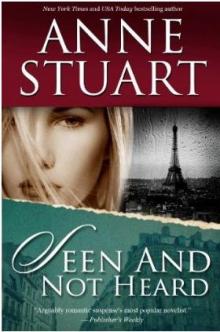 Seen and Not Heard
Seen and Not Heard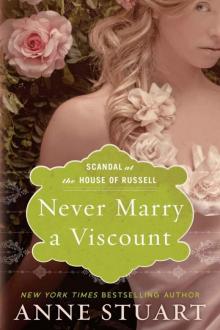 Never Marry a Viscount
Never Marry a Viscount Heartless
Heartless The Devil's Waltz
The Devil's Waltz Hidden Honor
Hidden Honor Silver Falls
Silver Falls Fire and Ice
Fire and Ice Nightfall
Nightfall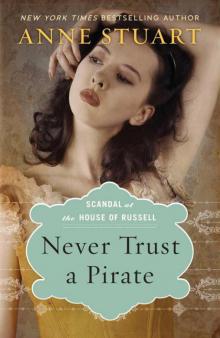 Never Trust a Pirate
Never Trust a Pirate The Soldier and the Baby
The Soldier and the Baby Still Lake
Still Lake Reckless
Reckless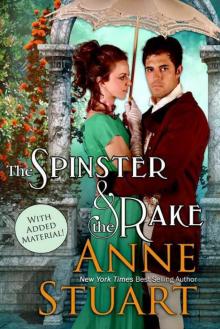 The Spinster and the Rake
The Spinster and the Rake Winter's Edge
Winter's Edge At the Edge of the Sun
At the Edge of the Sun Into the Fire
Into the Fire Night of the Phantom
Night of the Phantom Ritual Sins
Ritual Sins Darkness Before the Dawn
Darkness Before the Dawn Against the Wind
Against the Wind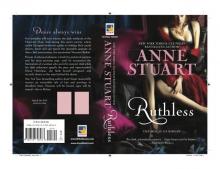 Ruthless
Ruthless The Catspaw Collection
The Catspaw Collection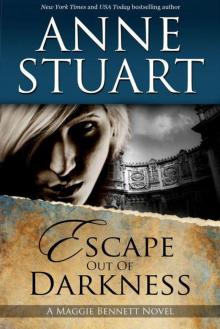 Escape Out of Darkness
Escape Out of Darkness The Widow
The Widow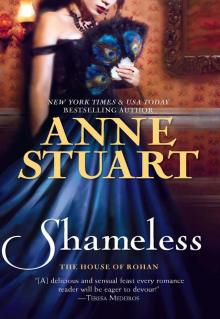 Shameless
Shameless Black Ice
Black Ice Breathless
Breathless Shadows at Sunset
Shadows at Sunset Falling Angel
Falling Angel Housebound
Housebound Cold as Ice
Cold as Ice The Wicked House of Rohan
The Wicked House of Rohan Lord of Danger
Lord of Danger The High Sheriff of Huntingdon
The High Sheriff of Huntingdon Wildfire
Wildfire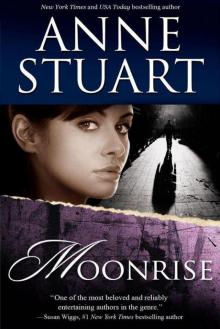 Moonrise
Moonrise The Demon Count's Daughter
The Demon Count's Daughter Date With a Devil
Date With a Devil To Love a Dark Lord
To Love a Dark Lord Driven by Fire
Driven by Fire Special Gifts
Special Gifts Ice Storm
Ice Storm Shadow Lover
Shadow Lover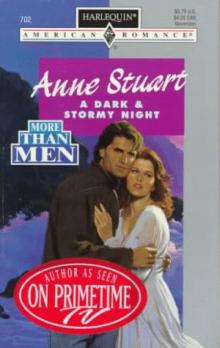 A Dark & Stormy Night
A Dark & Stormy Night Now You See Him...
Now You See Him...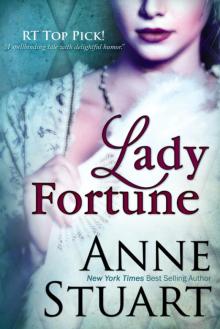 Lady Fortune
Lady Fortune Glass Houses
Glass Houses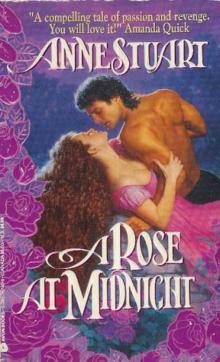 A Rose at Midnight
A Rose at Midnight Prince of Swords
Prince of Swords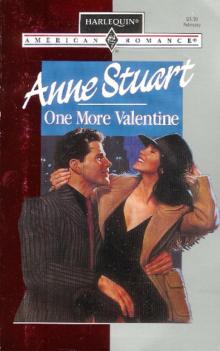 One More Valentine
One More Valentine Return to Christmas
Return to Christmas Tangled Lies
Tangled Lies Consumed by Fire
Consumed by Fire The Fall of Maggie Brown
The Fall of Maggie Brown Wild Thing
Wild Thing Crazy Like a Fox
Crazy Like a Fox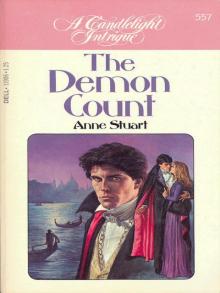 The Demon Count
The Demon Count Prince of Magic
Prince of Magic Wildfire (The Fire Series Book 3)
Wildfire (The Fire Series Book 3)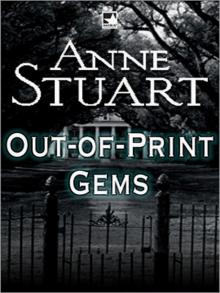 Anne Stuart's Out-of-Print Gems
Anne Stuart's Out-of-Print Gems Shadow Dance
Shadow Dance Under an Enchantment: A Novella
Under an Enchantment: A Novella Demonwood
Demonwood Blue Sage (Anne Stuart's Greatest Hits Book 3)
Blue Sage (Anne Stuart's Greatest Hits Book 3) Barrett's Hill
Barrett's Hill Angel's Wings (Anne Stuart's Bad Boys Book 5)
Angel's Wings (Anne Stuart's Bad Boys Book 5) Darkness Before Dawn
Darkness Before Dawn The Right Man
The Right Man The Houseparty
The Houseparty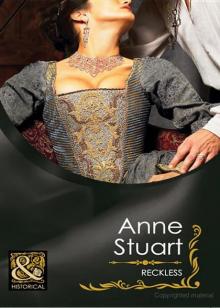 Reckless_Mills & Boon Historical
Reckless_Mills & Boon Historical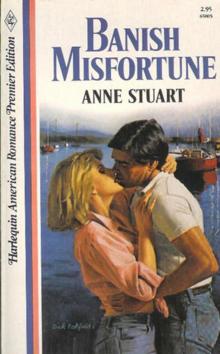 Banish Misfortune
Banish Misfortune Angel's Wings
Angel's Wings Chain of Love
Chain of Love Consumed by Fire (The Fire Series)
Consumed by Fire (The Fire Series) Partners in Crime (Anne Stuart's Bad Boys Book 4)
Partners in Crime (Anne Stuart's Bad Boys Book 4) The Soldier, The Nun and The Baby (Anne Stuart's Greatest Hits Book 2)
The Soldier, The Nun and The Baby (Anne Stuart's Greatest Hits Book 2)